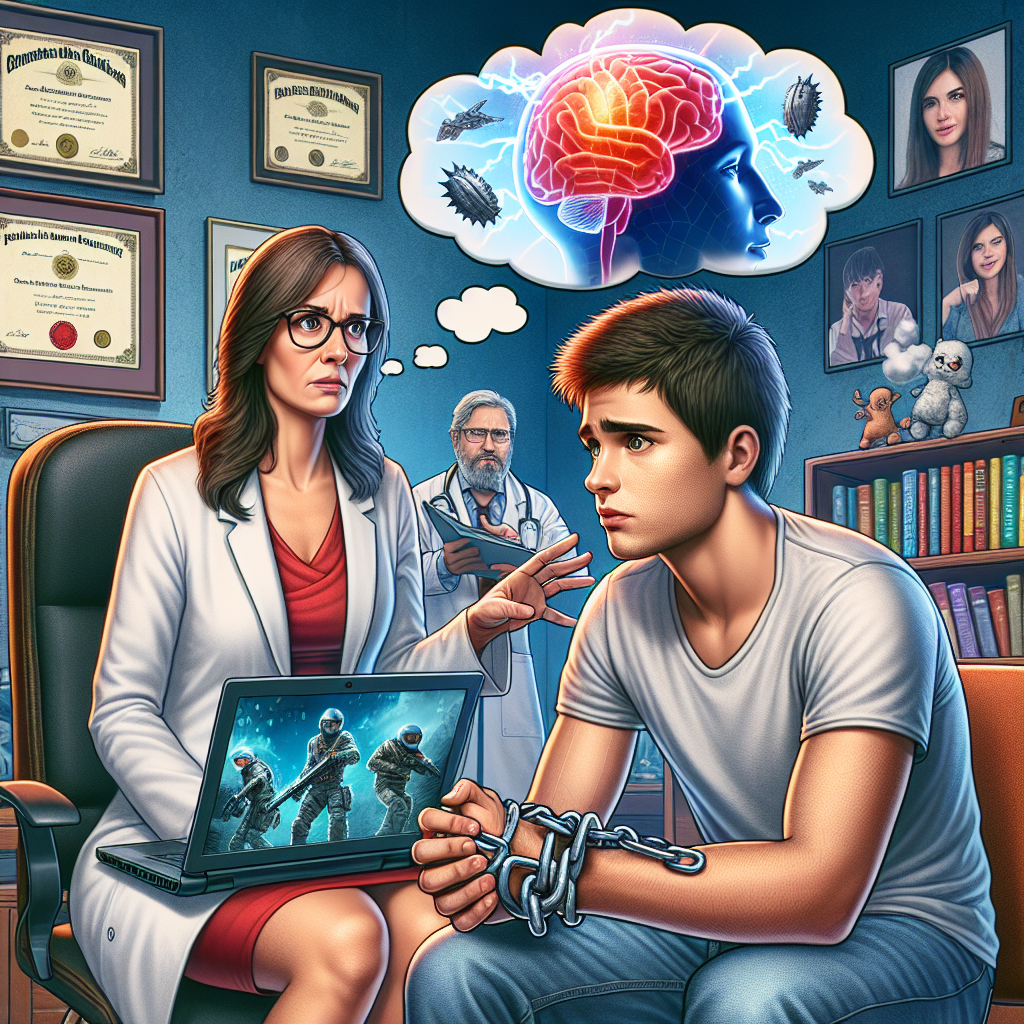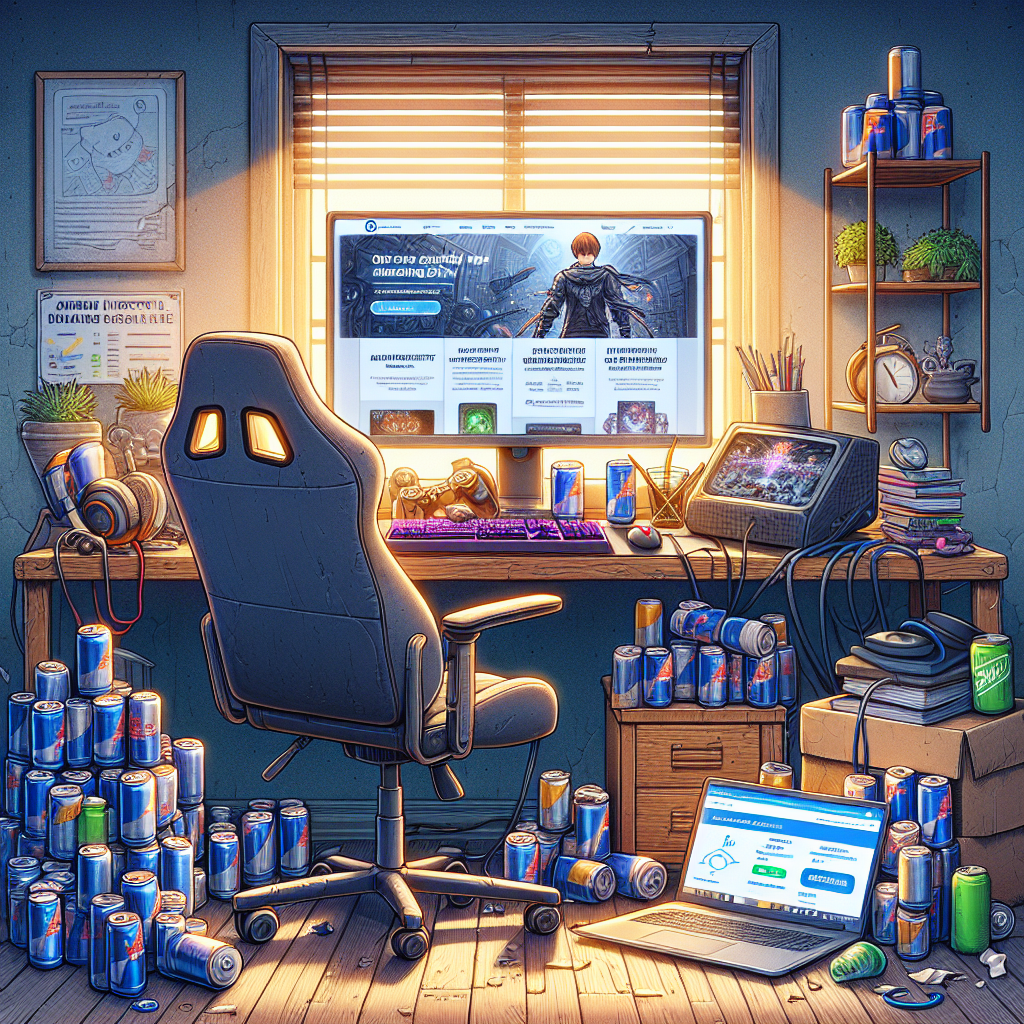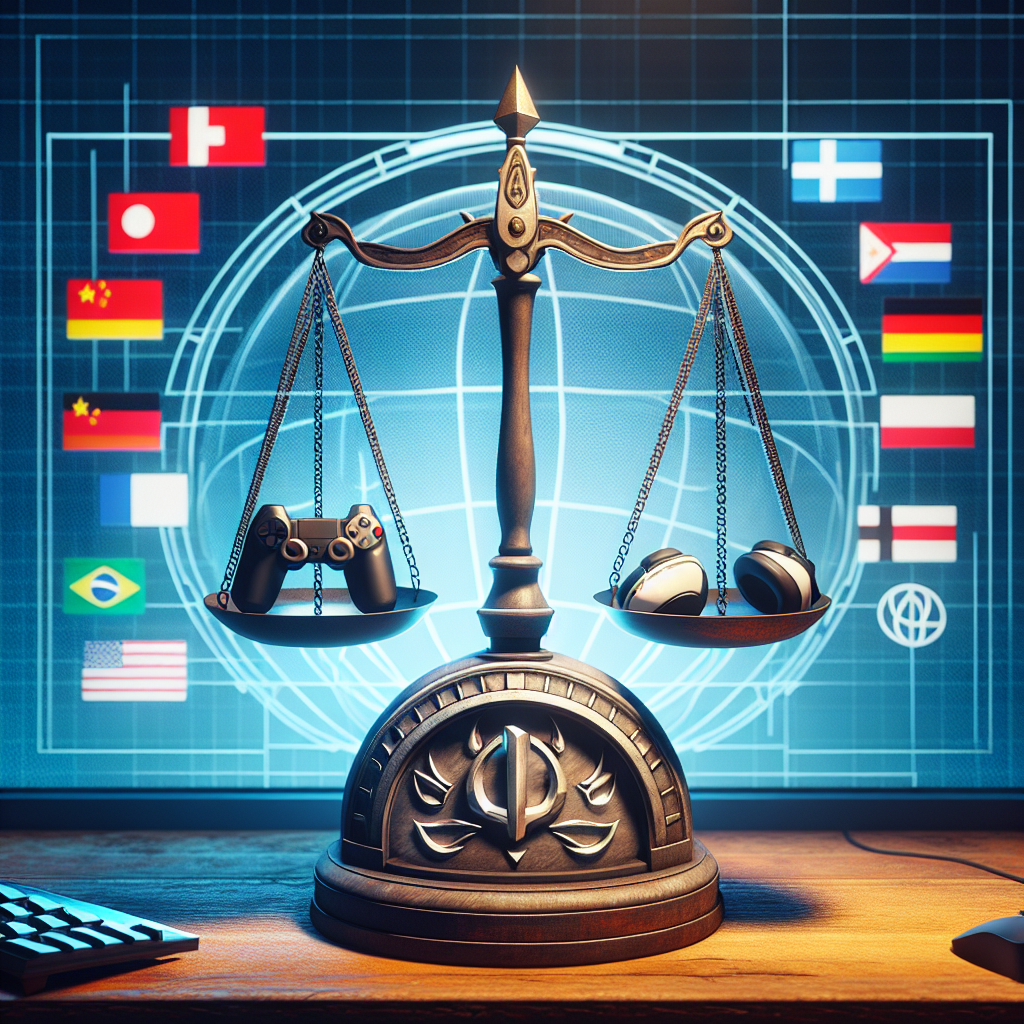In today’s digital age, online gaming addiction has become a prevalent issue affecting individuals of all ages. Everything is so high speed just like their internet. Many individuals find themselves unable to control their time spent on gaming, leading to negative consequences in various areas of their lives. Thankfully, there are effective strategies available to help those struggling with online gaming addiction. This article will delve into some of the most successful approaches to providing support and assistance to individuals who are battling this addiction. From therapy and counseling to self-help techniques and online support groups, there are a plethora of resources available to help individuals break free from the grips of online gaming addiction. Join us as we explore the various ways in which individuals can find the help they need to overcome this addiction and reclaim their lives.
Understanding Online Gaming Addiction
Online gaming addiction is a condition characterized by excessive and compulsive use of online video games, leading to negative consequences in various aspects of an individual’s life.
- Definition of online gaming addiction
- Online gaming addiction, also known as internet gaming disorder, is recognized as a behavioral addiction where individuals prioritize gaming over other activities, despite experiencing negative consequences.
- Signs and symptoms of online gaming addiction
- Persistent preoccupation with gaming.
- Withdrawal symptoms when not playing.
- Loss of interest in other activities.
- Continued excessive gaming despite knowing the negative effects.
- Lying about the amount of time spent gaming.
- Neglecting responsibilities and relationships due to gaming.
- Impact of online gaming addiction on individuals
- Impaired academic or work performance.
- Sleep disturbances and irregularities.
- Physical health issues like obesity or repetitive strain injuries.
- Mental health problems such as anxiety and depression.
- Social isolation and strained relationships.
- Financial difficulties due to in-game purchases or neglecting work.
Seeking Help for Online Gaming Addiction

Seeking help for online gaming addiction is crucial in addressing the issue before it escalates further. Individuals struggling with excessive gaming habits should prioritize seeking assistance at the earliest signs of addiction to prevent negative consequences. Here are some detailed insights into seeking help for online gaming addiction:
- Importance of seeking help early
Early intervention plays a pivotal role in effectively managing online gaming addiction. Addressing the problem promptly can prevent it from intensifying and causing severe disruptions to one’s personal, social, and professional life. Seeking help early increases the chances of successful recovery and minimizes the potential harm associated with prolonged addiction.
- Different methods of seeking help
There are various avenues through which individuals can seek help for online gaming addiction. These include:
- Therapy and Counseling: Professional therapy sessions with psychologists or counselors specializing in addiction can provide individuals with the necessary tools and strategies to overcome their gaming habits.
- Support Groups: Joining support groups or online forums dedicated to gaming addiction can offer a sense of community and understanding from others facing similar challenges.
- Online Resources: Utilizing online resources such as self-help guides, articles, and digital programs designed to address gaming addiction can be a convenient and accessible way to seek help.
- Benefits of professional guidance
Seeking help from trained professionals in the field of addiction can offer numerous benefits, including:
- Specialized Expertise: Professionals can offer specialized knowledge and expertise in understanding the underlying causes of gaming addiction and developing personalized treatment plans.
- Emotional Support: Therapists and counselors can provide emotional support and guidance throughout the recovery process, helping individuals navigate challenges and setbacks.
- Accountability: Professionals can help individuals set goals, track progress, and hold them accountable for their actions, fostering a sense of responsibility and commitment to change.
Online Resources for Gaming Addiction Help
Websites
- Reliable websites offering information and support
Various reputable websites provide valuable resources for individuals seeking help for online gaming addiction. These sites typically offer comprehensive information on the signs and symptoms of gaming addiction, the impact it can have on one’s life, and strategies for managing and overcoming addiction. They may also include self-assessment tools to help individuals determine the severity of their addiction and connect them with appropriate support services. Additionally, these websites often feature articles, videos, and personal stories from individuals who have successfully navigated their addiction to online gaming.
- Forums and communities for individuals struggling with gaming addiction
Online forums and communities dedicated to gaming addiction offer a supportive environment for individuals to share their experiences, seek advice, and connect with others facing similar challenges. These platforms allow users to engage in discussions, ask questions, and receive peer support from individuals who understand the complexities of gaming addiction. Moderated by professionals or experienced individuals, these forums can provide a sense of community and belonging, reducing feelings of isolation often associated with addiction. Moreover, these platforms may offer resources such as online meetings, group therapy sessions, and access to mental health professionals specializing in gaming addiction.
Apps
Mobile applications have been developed specifically to assist individuals in managing their online gaming habits. These apps offer a range of features aimed at tracking and limiting gaming time, providing users with tools to monitor their gameplay and set restrictions when needed.
Features of apps for tracking and limiting gaming time may include:
- Time Management Tools: Apps can help users set specific limits on daily or weekly gaming hours, sending notifications when these limits are reached.
- Activity Monitoring: Some apps track gaming patterns and provide insights into the amount of time spent on different games or platforms.
- Goal Setting: Users can establish goals for reducing gaming hours or taking breaks, with the app offering reminders and progress tracking.
- Parental Controls: Certain apps come with features allowing parents to monitor and manage their child’s gaming habits, setting restrictions and receiving usage reports.
Overall, these apps serve as practical tools for individuals seeking to gain better control over their online gaming behavior and work towards a healthier balance in their lives.

Support Systems for Gamers
Family and Friends
- Role of family and friends in providing support: Family and friends play a crucial role in providing support to individuals struggling with online gaming addiction. They can offer emotional support, guidance, and encouragement throughout the recovery process. By being understanding and non-judgmental, loved ones can create a safe space for the gamer to open up about their struggles and seek help. Additionally, family and friends can assist in creating a structured daily routine that includes time for activities other than gaming, promoting a healthier balance in the individual’s life.
- Communication strategies for loved ones of individuals with gaming addiction: Effective communication is essential when supporting a loved one with gaming addiction. It is important for family and friends to approach the conversation with empathy and understanding, avoiding blame or criticism. Active listening is key, allowing the gamer to express their feelings and concerns openly. Setting boundaries around gaming habits can also be beneficial, encouraging moderation and responsible gaming behavior. Encouraging the individual to seek professional help and offering to assist them in finding resources can further support their journey towards recovery.
Therapists and Counselors
- How therapists can help individuals overcome gaming addiction
Therapists and counselors play a crucial role in helping individuals overcome gaming addiction by providing a supportive and non-judgmental environment for them to explore the root causes of their excessive gaming behaviors. Through individual or group therapy sessions, therapists can help gamers develop coping strategies, improve self-regulation skills, and address underlying mental health issues contributing to their addiction. - Types of therapy effective for treating gaming addiction
- Cognitive-Behavioral Therapy (CBT): CBT is a commonly used therapeutic approach for treating gaming addiction as it helps individuals identify and change negative thought patterns and behaviors associated with excessive gaming. Therapists work with gamers to challenge irrational beliefs, set goals for behavior change, and develop healthier coping mechanisms.
- Mindfulness-Based Therapy: Mindfulness-based interventions can be effective in helping individuals with gaming addiction increase their awareness of their thoughts, emotions, and behaviors in the present moment. By practicing mindfulness techniques, gamers can learn to better regulate their impulses and reduce the urge to engage in excessive gaming.
- Family Therapy: In cases where family dynamics contribute to or are affected by gaming addiction, family therapy can be beneficial. Therapists work with both the individual struggling with addiction and their family members to improve communication, set boundaries, and address underlying family issues that may be maintaining the addictive behavior.
- Motivational Interviewing: Motivational interviewing techniques can help individuals with gaming addiction explore their ambivalence towards change and increase their motivation to seek help. Therapists use a collaborative and empathetic approach to help gamers identify their personal values and goals, ultimately empowering them to make positive changes in their gaming habits.

In conclusion, therapists and counselors play a vital role in providing effective support and interventions for individuals struggling with online gaming addiction. By utilizing various therapeutic approaches tailored to the unique needs of each individual, therapists can help gamers regain control over their gaming habits and improve their overall well-being.
Self-Help Strategies for Gaming Addiction
Setting limits on gaming time
Setting limits on gaming time is a crucial self-help strategy for individuals struggling with online gaming addiction. By establishing specific boundaries on how much time can be spent gaming each day, players can regain control over their habits. This can be achieved by creating a schedule outlining designated gaming periods and sticking to it rigorously. Additionally, utilizing tools such as alarms or timers to alert when the allotted gaming time is up can be beneficial in preventing excessive gameplay.
Engaging in alternative activities
Engaging in alternative activities is another effective self-help strategy for combating online gaming addiction. By redirecting focus and energy towards hobbies, exercise, social interactions, or other interests, individuals can reduce the allure of gaming and break the cycle of addiction. Exploring new activities that bring joy and fulfillment can help fill the void left by excessive gaming and provide a healthier outlet for relaxation and entertainment.
Practicing mindfulness and self-care techniques
Practicing mindfulness and self-care techniques can also aid in addressing online gaming addiction. Mindfulness practices, such as meditation and deep breathing exercises, can help individuals become more aware of their thoughts and emotions surrounding gaming, allowing them to develop healthier coping mechanisms. Additionally, prioritizing self-care activities, such as adequate sleep, nutritious diet, and regular physical activity, can improve overall well-being and reduce the urge to escape into excessive gaming.
Overcoming Challenges in Recovery
Dealing with relapses
Relapses are a common occurrence in the recovery journey of individuals struggling with online gaming addiction. It is essential to approach relapses with understanding and a proactive mindset to prevent them from derailing progress. Here are some strategies to effectively deal with relapses:
- Self-reflection: Encourage individuals to reflect on the circumstances leading to the relapse, identify triggers, and learn from the experience.
- Seek professional help: Encourage individuals to reach out to therapists or support groups specialized in gaming addiction to navigate through the challenges of relapse.
- Develop a relapse prevention plan: Work with individuals to create a comprehensive plan that includes coping strategies, healthy activities, and ways to avoid triggers in the future.
Building a strong support network
Having a strong support network is crucial in overcoming online gaming addiction. It provides individuals with the necessary encouragement, guidance, and accountability to stay on track. Here are ways to build a robust support system:
- Family and friends: Encourage individuals to confide in trusted loved ones about their struggles and seek their support in times of need.
- Support groups: Suggest joining online or in-person support groups specifically tailored to gaming addiction to connect with others facing similar challenges.
- Therapists and counselors: Recommend seeking professional help from therapists or counselors experienced in addiction treatment to receive personalized guidance and support.
Recognizing triggers and developing coping mechanisms
Identifying triggers that lead to excessive gaming is essential for effective recovery. By recognizing these triggers, individuals can develop healthy coping mechanisms to manage cravings and urges. Here are steps to recognize triggers and develop coping strategies:
- Self-awareness: Encourage individuals to reflect on their emotions, thoughts, and behaviors to pinpoint situations that trigger gaming episodes.
- Healthy distractions: Help individuals discover alternative activities such as exercise, hobbies, or socializing to divert their attention from gaming triggers.
- Stress management techniques: Teach individuals relaxation techniques, mindfulness practices, or deep breathing exercises to cope with stress and anxiety without resorting to gaming.
FAQs for Exploring Effective Strategies for Online Gaming Addiction Help
What are some common signs of online gaming addiction?
Some common signs of online gaming addiction include spending excessive amounts of time playing games, neglecting responsibilities or relationships in favor of gaming, feeling irritable or anxious when not playing, and experiencing physical health issues due to extended gameplay. It is important to be aware of these signs and seek help if you or someone you know may be struggling with online gaming addiction.
How can I help someone who is addicted to online gaming?
If you suspect that someone you know is addicted to online gaming, it is important to approach the situation with empathy and understanding. Encourage open communication and offer your support in finding help. Suggest seeking professional counseling or therapy, as well as exploring support groups or online resources specifically geared towards gaming addiction. Remember to be patient and non-judgmental throughout the process.
Are there effective strategies for overcoming online gaming addiction?
Yes, there are several effective strategies for overcoming online gaming addiction. These may include setting limits on gaming time, finding healthier hobbies or activities to replace gaming, seeking professional counseling or therapy, and building a strong support system. It is important for individuals struggling with gaming addiction to address the underlying reasons for their behavior and develop coping mechanisms to manage cravings and urges to play.
Is online gaming addiction a serious problem?
Yes, online gaming addiction can be a serious problem that can have negative effects on a person’s mental, emotional, and physical well-being. It can lead to social isolation, poor academic or work performance, and strained relationships with loved ones. Seeking help and addressing the addiction in a timely manner is crucial in order to prevent further negative consequences and improve overall quality of life.


